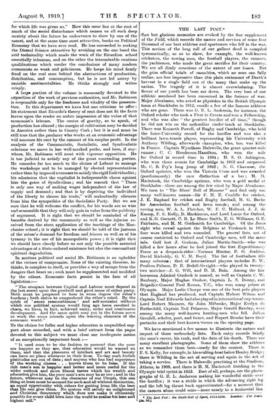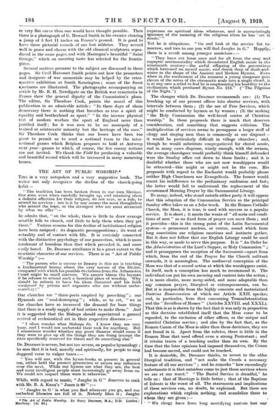THE LAST POST.*
SAD but glorious memories are evoked by the fine supplement of the Field, which records the names and services of some four thousand of our best athletes and sportsmen who fell in the war. This section of the long roll of our gallant dead is compiled systematically, so as to show, for example, the well-blown cricketers, the rowing men, the football players, the runners, the yachtsmen, who made the great sacrifice for their country. We are all dimly conscious of the extent of our losses. But the grim official totals of casualties, which no man can fully realize, are less impressive than this plain statement of Death's harvest in a single field out of the many that make up the nation. The tragedy, of it is almost overwhelming. The flower of our youth has been cut down. The very beet of our athletic manhood has been consumed in the furnace of war. Major Abrahams, who acted as physician to the British Olympic team at Stockholm in 1912, recalls a few of the famous athletes who are gone. There was G. R. L. Andersen, for instance, the Oxford scholar who took a First in Greats and won a Fellowship, and who was also "the greatest hurdler of all time," though he did not win on the unfamiliar cinder-track at Stockholm. There was Kenneth Powell, of Rugby and Cambridge, who held the Inter-University record for the hurdles and was also a brilliant lawn-tennis player, representing his University with Anthony Wilding, afterwards champion, who, too, was killed In France. Captain Wyndham Halswelle, the great quarter-mile runner ; C. C. Henderson-Hamilton, who won the mile for Oxford in record time in 1904; H. S. 0. Ashington, who won three events for Cambridge in 1913 and surpassed Mr. C. B. Fry's long jump of 1892; N. G. Chavasse, the Oxford sprinter, who won the Victoria Cross and was awarded (posthumously) the rare distinction of a bar ; H. lkf. Macintosh, the Cambridge sprinter, who won a gold medal at Stockholm—these are among the few cited by Major Abrahams. We turn to "The Blues' Roll of Honour" and find only too many well-known names—Sir F. H. E. Cunliffe for cricket, J. E. Raphael for cricket and Rugby football, H. G. Bache for Association football and lawn tennis ; and among the rowing men, W. A. L. Fletcher, W. F. 0. Holland, J. J. de Knoop, F. S. Kelly, D. Mackinnon, and Lord Lucas for Oxford, and K. G. Garnett, 0. R. Le Blanc Smith, E. G. Williams, G. E. Fairbairn, and H. M. Goldsmith for Cambridge. Of the Jesus eight who rowed against the Belgians at Ferdonck in 1911, four were killed and two wounded. The general lists, not of course restricted to Oxford and Cambridge men, tell the same tale. Golf lost J. Graham, Julian Martin-Smith—who was killed a few hours after he had joined the first Expeditionary Force as a despatch-rider—Norman Hunter, P. G. Jenkins,
David Kirkaldy, G. V. M. Boyd. The list of footballers fills many columns; that of international players includes R. W. Poulton-Palmer, D. R. Bedell-Sivright—who played in twentytwo matches—J. Cl. Will, and D. M. Bain. Among the fine
horsemen Admiral Credo,* is named, as well as Captain C. W. Banbury, Major Hughes Onslow, Captain L. S. Denny, and Brigadier-General Paul Kenna, V.C., who won many prizes at Olympia. Major Leslie Cheape was one of the best polo players that England has produced, and Captain Hubert Wilson and
Captain Noel Edwards had also played in international cup-teams. Lord Robert Manners, Sir John Milbanke, Major Evelyn do Rothschild, Captain Neil Primrose, Major Gerald Barclay, were among the many well-known hunting-men who fell. Julian Grenfell, scholar, poet, and boxer, and Rupert Brooke have their portraits and their best-known 'verses on the opening page.
We have mentioned a few names to illustrate the nature and import of these melancholy bets. Each entry records briefly the man's career, his rank, and the date of his death. There are many excellent photographs. Some of them show the athletes as we remember them best—ready for the contest. There is F. S. Kelly, for example, in his eculling-boat below Henley Bridge; there is Wilding in the act of serving and again in the act of taking a service. There is Halswelle practising at the Stadium, Athens, in 1908, and there is H. M. Macintosh finishing in the Olympic trial sprint in 1912. Best of all, perhaps, are the photographs of G. R. L. Anderson making his wonderful stride over the hurdles ; it was a stride in which the advancing right leg and the left leg thrust back .approximated—for a moment that the camera alone could seize—more nearly to a horizontal line
or very flat curve than one would have thought possible. Then there is a photograph of G. Howard Smith in his sweater clearing a jump of 5 feet 11 inches on Fenner's ground. It is good to have these pictorial records of our lost athletes. They accord well in grace and charm with the old classical sculptures reproduced in the same pages, and with Mantegna's beautiful "Saint George," which an unerring taste has selected for the frontispiece.
Several matters germane to the subject are discussed in these pages. Sir Cecil Harcourt Smith points out how the promoters and designers of war memorials may be helped by the retrospective exhibition at South Kensington ; some of the finest specimens are illustrated. The photographs accompanying an article by Mr. B. H. Newdigate on the British war cemeteries in France show the general dignity of the Commission's plans. The editor, Sir Theodore Cook, points the moral of this publication in an admirable article : "In these days of sham democracy there is nothing that breathes so true a spirit of equality and brotherhood as sport." "In the intense physical test of modern warfare the sport of England more than justified itself ; for it was seen to be no monopoly of a trained or aristocratic minority but the heritage of the race." Sir Theodore Cook thinks that our losses have been too great to permit us to send a national team to the international games which Belgium proposes to hold at .Antwerp next year—games to which, of course, the five enemy nations are not invited. We thank the Field for producing a valuable and beautiful record which will be treasured in many mourning homes.



































 Previous page
Previous page